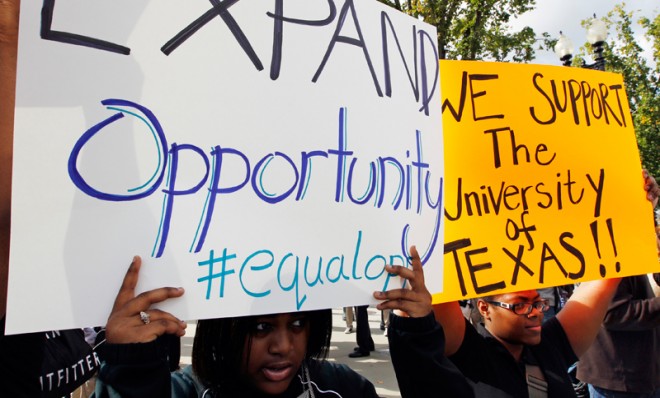How the Supreme Court ducked on affirmative action
In a limited ruling, the high court punts on the central question of affirmative action's legality


A free daily email with the biggest news stories of the day – and the best features from TheWeek.com
You are now subscribed
Your newsletter sign-up was successful
After months of speculation that the Supreme Court would issue a landmark ruling either upholding or striking down affirmative action, the high court on Monday opted instead to avoid tackling the issue head-on, saving that question for another day.
In a 7-1 decision, the justices vacated a lower court's ruling that approved of the University of Texas' affirmative action program, and sent the case back down for further consideration. Writing the majority opinion, Justice Anthony M. Kennedy said the 5th U.S. Circuit Court of Appeals did not adequately address whether the university had properly applied that program in the first place.
Precedent from previous cases allowed schools to impose "narrowly tailored" affirmative action programs when "no workable race-neutral alternatives" are available, Kennedy wrote. But the appeals court merely took the school at its word that its program met those criteria, rather than thoroughly evaluating it.
The Week
Escape your echo chamber. Get the facts behind the news, plus analysis from multiple perspectives.

Sign up for The Week's Free Newsletters
From our morning news briefing to a weekly Good News Newsletter, get the best of The Week delivered directly to your inbox.
From our morning news briefing to a weekly Good News Newsletter, get the best of The Week delivered directly to your inbox.
"Strict scrutiny does not permit a court to accept a school's assertion that its admissions process uses race in a permissible way without closely examining how the process works in practice," Kennedy wrote.
However, the Supreme Court declined to answer that question itself, instead putting the onus on the lower court. In doing so, the justices avoided, for now, either upholding or abolishing wholesale the practice of affirmative action.
The case, Fisher v. University of Texas at Austin, stems from a lawsuit filed by a white woman, Abigail Fisher, who claimed the university denied her admissions application because of her race. Justice Ruth Bader Ginsburg was the lone dissenter in the case, while Justice Elena Kagan recused herself, presumably because she had worked on it as U.S. solicitor general.
While the ruling effectively allowed affirmative action to stand, the justices indicated that the program was "not on solid legal ground and could still be overturned," said Reuters' Lawrence Hurley. Subsequent cases could chip away at affirmative action, something the conservative justices seemed to already be preparing for.
A free daily email with the biggest news stories of the day – and the best features from TheWeek.com
Indeed, that gradual chipping could begin later this year. In March, the Supreme Court agreed to hear another affirmative action case in its next term. Some said at the time that the court, by taking on a second affirmative action case before deciding on Fisher, indicated it would wait until the second case to deliver a major ruling.
As SCOTUSblog's Lyle Denniston wrote back in March, the Texas case "focuses directly only on the specifics of an affirmative action plan at Texas's flagship university in Austin," whereas the Michigan case was "significantly broader" and thus more liable to produce a sweeping decision. That case, Schuette v. Michigan Coalition to Defend Affirmative Action, stems from a 2006 ballot initiative that banned race-based considerations in higher education and public employment.
You can read the court's full opinion below:
Jon Terbush is an associate editor at TheWeek.com covering politics, sports, and other things he finds interesting. He has previously written for Talking Points Memo, Raw Story, and Business Insider.
-
 The Week Unwrapped: Have televised confessions quelled protests in Iran?
The Week Unwrapped: Have televised confessions quelled protests in Iran?Podcast Plus, why has Elon Musk turned from Mars to the Moon? And will the BBC prove to be a puzzles champ?
-
 The week’s best photos
The week’s best photosIn Pictures An Andean god, a rogue squirrel, and more
-
 AI surgical tools might be injuring patients
AI surgical tools might be injuring patientsUnder the Radar More than 1,300 AI-assisted medical devices have FDA approval
